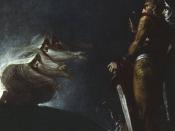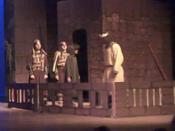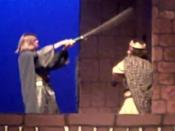In most of Shakespeare's tragedies contain a tragic hero, and in these characters they have a tragic or fatal flaw, and blind spot that leads to there downfall. When the play was first seen people believed in the divine right of kings and really believed in witches, this made it really easy for Shakespeare to create an evil character; and although you don't see this the whole way through you get many messages of him being torn in two, a tragic hero.
The first scene that you see is three witches, and right from the start you feels uneasy because Shakespeare has put stage directions in so that there is an ere atmosphere, 'Thunder and lightning' this make the audience fell perturbed, as if they are in danger. This is the first scene that is shown and would have made the audience of the time feel very apprehensive about Macbeth as he is almost immediately shown to be connected with dark magic and witches.
There are also many examples where Shakespeare uses language to confuse audience and make them feel on edge, such as 'when the battles lost and won' which makes the witch's seem weird, therefore causing the audience to feel hesitant towards Macbeth. Other examples of perplexed language include 'Foul is fair, and fair is foul' and 'that will be ere the set of sun' and this is all in first scene, consequently making the audience feel cautious about the witches and their connection to Macbeth. In this very first scene Shakespeare starts to shows the beginning of Macbeth's downfall.
But then almost instantaneity in the next scene everything is completely the opposite, the language is reasonably straight forward and things are happy. Macbeth is shown to be a massive hero, the one that saved the kings son, 'For brave Macbeth - well he deserves that name' and unlike the last scene the audience would feel admiration for Macbeth as he helped win the battle. The king feels greatly indebted to him as he says 'O valiant cousin, worthy gentleman', and this causes the audience to again feel respect for Macbeth. But as the story unfolds there is another scene with the witches' where the witches' talk to Macbeth, shows that they are directly related to Macbeth, which gives the audience the impression that Macbeth is not all good. The audience at the time would have believed in witches making it very easy for Shakespeare to portray a person who has dealings with the people are beyond science and are 'evil'. If you look at the play in the eyes of those who had first seen it then I think that you would see a completely different play, not only would killing the king be the most absolutely awful thing you could do, but even talking to anyone who had anything to do with witch craft would be quite disgraceful. All of this makes the audience feel quite mixed about Macbeth, he is somebody great, heroic but in some places he is already showing his tragic flaw, even though he has just been shown to be very much respected by others; Macbeth shows that he is already wants to kill the king, he has thought about how he wants to become the king no matter what it takes. This shocks the audience because he has been shown to be so great and heroic, but deep down he has dark and horrid desires; and in this scene even he is shocked by how he wants to be king, 'Why do I yield to that suggestion whose horrid image doth unfix my hair'.
This one scene shows Macbeth in two different ways, he is shown to be a great victorious hero, but then when he is thinking he shows his darkest desires. This
Even though I don't think Shakespeare would have thought this play would still be performed 400 years on, we can still make this relevant to our lives today, if you imagined the king as the Prime Minister and the witches as Al Qaeda. Would you still think that someone who blew up the Prime Minister as a tragic hero? If you look at it like this then the play takes on a new meaning, I don't think that Shakespeare intended Macbeth to be a tragic hero. But then if you look deeper into the play then you see all the factors that made him kill the king and you make yourself look at it two ways, the first being that he was pushed into killing the king by his wife and given false hope by the three witches. Or you can see that Macbeth made himself vulnerable by believing that he could get away with committing the worst crime of the time. Either way you look at it Shakespeare uses various techniques to create certain effects. One of these is dramatic irony, in nearly all the major events the audience knows before Macbeth does.
The audience knows that Macbeth is going to be connected to the witches before he does, in the very first scene Shakespeare gives a massive amount of dramatic irony; the witches are talking about meeting Macbeth, before he even knows that the witches exist. And then Shakespeare gives us another massive insight into what is going to happen before Macbeth knows, Shakespeare tells us that Macbeth is going to become Thane Of Cawdor, whilst just a few moments before Macbeth has been saying that what the witches' have just told him cant possibly happen, 'Macbeth: But how of Cawdor? The Thane of Cawdor lives'. All this dramatic irony makes the audience feels as if they are one step ahead of Macbeth, which in later times that it is used in the play makes Macbeth seem foolish and sometimes arrogant.






